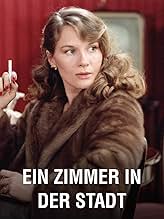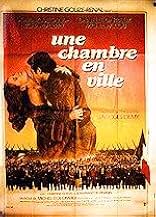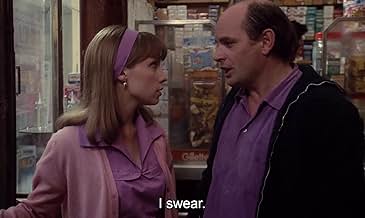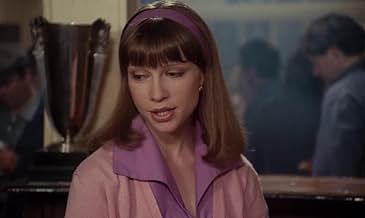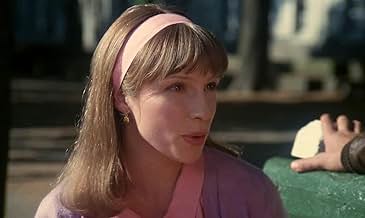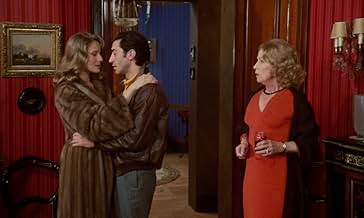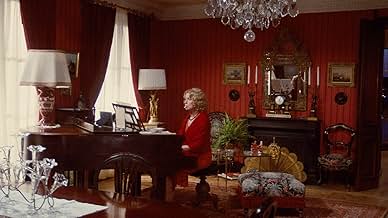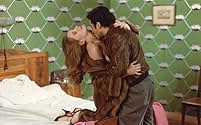PUNTUACIÓN EN IMDb
6,7/10
1,8 mil
TU PUNTUACIÓN
Un musical alrededor del tema de los derechos de los trabajadores, con una huelga de fondo, y sobre las relaciones que se forman en este contexto.Un musical alrededor del tema de los derechos de los trabajadores, con una huelga de fondo, y sobre las relaciones que se forman en este contexto.Un musical alrededor del tema de los derechos de los trabajadores, con una huelga de fondo, y sobre las relaciones que se forman en este contexto.
- Dirección
- Guión
- Reparto principal
- Premios
- 3 premios y 10 nominaciones en total
Florence Davis
- Edith
- (doblaje en canto)
Reseñas destacadas
Workers during a strike prepare and perform a demonstration, and two personal relations develop against this background. François (Richard Berry) abandons his pregnant girlfriend Violette (Fabienne Guyon, appropriately dressed in violet), and meets a very beautiful upper class girl, Edith (Dominique Sanda).
This was my first experience with Jacques Demy, and I was immediately smitten. The backdrop recalls something like "Les Miserables", based on Demy's own witnessing of a shipyard strike, though the focus here is much more on the love triangle, and Francois Guilbard is not the tragic character that Jean Valjean is (in fact, Francois is kind of a rat).
Musicals are not my favorite genre, but I think this was done right... every line sounds amazing, and it works to have it done without any speaking. The dark themes even hark back to classic operas more than the saccharine musicals of modern Hollywood. Where the plot may be less than perfect, it is made up for by the mere presence of such striking and talented actors.
Unfortunately for Demy, many consider his best years 1961-1967, with the exception of "Donkey Skin" (1970) and completely disregard this film. Despite being nominated for nine Cesars (basically the French Oscars), it won none of them.
This was my first experience with Jacques Demy, and I was immediately smitten. The backdrop recalls something like "Les Miserables", based on Demy's own witnessing of a shipyard strike, though the focus here is much more on the love triangle, and Francois Guilbard is not the tragic character that Jean Valjean is (in fact, Francois is kind of a rat).
Musicals are not my favorite genre, but I think this was done right... every line sounds amazing, and it works to have it done without any speaking. The dark themes even hark back to classic operas more than the saccharine musicals of modern Hollywood. Where the plot may be less than perfect, it is made up for by the mere presence of such striking and talented actors.
Unfortunately for Demy, many consider his best years 1961-1967, with the exception of "Donkey Skin" (1970) and completely disregard this film. Despite being nominated for nine Cesars (basically the French Oscars), it won none of them.
10daflauta
Could be a sequence, although dealing with a different story, to Jacques Demy's Les Parapluies de Cherbourg. All the dialogues are sung by the excellent vocal team gathered once more by the director (see also Les Demoiselles de Rochefort, Peau d'Ane). Musical style this time completely different, by competent Michel Colombier, provides fluent and dramatic tension all over. Who is going to make such well-finished films from now on?
"Une Chambre de Ville" is a tragic opera set during the strike of a shipyard workers union in 1955. Against the backdrop of clashes between police and strikers, the story is about two star-crossed lovers.
Francois is one of the striking workers and Edith is the dissatisfied wife of a television salesman. Fate brings them together and the result feels Shakespearian. They sing of never-ending love, but this is a story about unhappiness--for them and the other main characters.
Though the lyrics/dialogue are rather unpoetic in a classical sense, the music is powerful and lyrical. Indeed, the musical score is one of the best parts of the film.
Noticeable attention has been paid the scenery, with an emphasis on bright colors, providing striking images.
The actors have adequate singing voices, but the central theme--the great love of Francois (Richard Berry) and Edith (Dominique Sanda)-- is unconvincing. Their love feels rather conventional, certainly not a love for the ages. The viewer wants to feel that each is an island oasis of love for the other, driving them to heights of passion and personal transformation. But instead they feel like two losers who converge for a desperate evening and remain unchanged. The musical score, which is so strong, promises a classic story of love, like "Phantom of the Opera", but the characters fall far short.
The film's ending is abrupt, and it serves to undermine the theme of everlasting love.
Francois is one of the striking workers and Edith is the dissatisfied wife of a television salesman. Fate brings them together and the result feels Shakespearian. They sing of never-ending love, but this is a story about unhappiness--for them and the other main characters.
Though the lyrics/dialogue are rather unpoetic in a classical sense, the music is powerful and lyrical. Indeed, the musical score is one of the best parts of the film.
Noticeable attention has been paid the scenery, with an emphasis on bright colors, providing striking images.
The actors have adequate singing voices, but the central theme--the great love of Francois (Richard Berry) and Edith (Dominique Sanda)-- is unconvincing. Their love feels rather conventional, certainly not a love for the ages. The viewer wants to feel that each is an island oasis of love for the other, driving them to heights of passion and personal transformation. But instead they feel like two losers who converge for a desperate evening and remain unchanged. The musical score, which is so strong, promises a classic story of love, like "Phantom of the Opera", but the characters fall far short.
The film's ending is abrupt, and it serves to undermine the theme of everlasting love.
I had thought Jacques Demy had abandoned his movie operas after the 1960s, but no, he hadn't, and here's the proof. He's working with Colombier instead of LeGrand, and there's a lot more recitative, but unlike others who have tried to translate opera onto the screen, he has cinematographer Jean Penzer shoot it like a movie.... although Mme. Darrieux's flat does look like a stage design.
I do wonder if her daughter is wearing only a fur coat, as the dialogue indicates.
I do wonder if her daughter is wearing only a fur coat, as the dialogue indicates.
I always love Demy, except the one discussing the pregnancy of a male-so called a comedy.. Bias, of course. He always give you classical fairy tales which takes you away from your real world. Then you are carried into another space, and you can fully focus on what you are watching. Please don't pause his movies or you'll definitely find them dull and boring! For me, his music strengthens the story. Females are all beautiful princesses or queens. immersed in love, in a way.. Catherine Denver is, of course, his perfect princess. In fact, no one is bad. Many hate his Donkey Skin but that's it's close to Plato's idea/ideal. Most important of all, his protest of war is so subtle that it goes deep down without any noticing...
¿Sabías que...?
- CuriosidadesDemy's longtime collaborator, composer Michel Legrand, strongly opposed the movie's social themes and urged the director to not do the movie. He ended up not being associated with the movie at all, and even in the 2010s, he was still trashing the movie in interviews.
- PifiasAround 01:11:53, Edith is holding a fire gun. Around 01:11:57, Edith is holding her bag and puts a tissue around her hand. However, she hasn't received a razor cut.
- Citas
Madame Pelletier: [singing] You worry too much about me. Think of yourself first, of your own life. I've lived mine.
- ConexionesFeatured in Jacquot de Nantes (1991)
Selecciones populares
Inicia sesión para calificar y añadir a tu lista para recibir recomendaciones personalizadas
- How long is A Room in Town?Con tecnología de Alexa
Detalles
- Fecha de lanzamiento
- País de origen
- Idioma
- Títulos en diferentes países
- A Room in Town
- Localizaciones del rodaje
- Place du Commerce, Nantes, Loire Atlantique, Francia(Where Violette goes to look for Guilbaud)
- Empresas productoras
- Ver más compañías en los créditos en IMDbPro
- Duración1 hora 30 minutos
- Color
- Mezcla de sonido
- Relación de aspecto
- 1.66 : 1
Contribuir a esta página
Sugerir un cambio o añadir el contenido que falta

Principal laguna de datos
By what name was Una habitación en la ciudad (1982) officially released in Canada in English?
Responde
![Bande-annonce [OV]](https://m.media-amazon.com/images/M/MV5BZGRhNTBmNzItZGNjMS00N2Y4LTkwODgtZjhjNTUxYjBiZmJmXkEyXkFqcGdeQXRyYW5zY29kZS13b3JrZmxvdw@@._V1_QL75_UX500_CR0)
